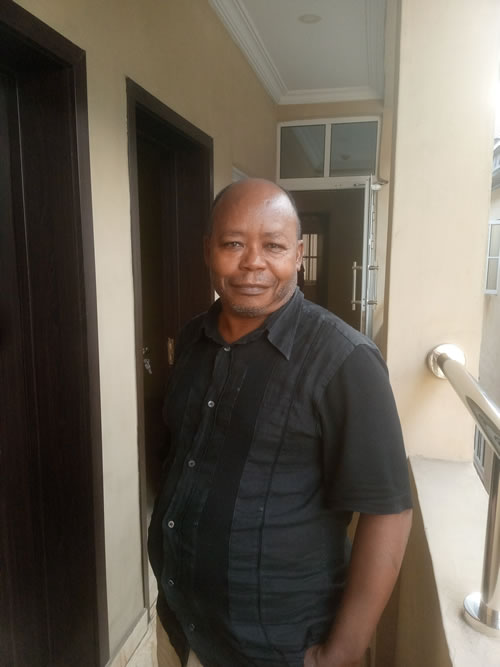Engr Josiah Wasa

Highlights of his interview
Born in 1957 at Takum Taraba State; early education at the missionary Sudan Interior Ministry primary and secondary schools, and at Ogoja; after Higher School Certificate examination, attended interview by the Nigerian National Oil Company in 1977 and was successful; later it was rechristened Nigerian National Petroleum Corporation; it created a subsidiary Nigerian National Tanker Company; the interview were conducted by NNPC admin officers and two British master mariners from the Cunard Shipping Services; the major requirement for success in the interviews was ability to swim, which he had; the successful cadets were issued employment letters and sent off to the UK; the first time he saw a ferry at Ibi operated by the NIWA; mentioned some of his peers, Nigerians, and expatriate colleagues; the intricacies of their training which was special as opposed to the current methods being used by the Nigerian Maritime Administration; some of the voyages he had been to; he had been to every continent in the world except Australia, sailing on tankers and general cargo vessels; his first trip to Nagoya port in Japan; other voyages, including on Cunard vessels which brought Toyota cars for R. T. Briscoe around 1980; also details of voyages on tanker ships, very large crude carriers (VLCCs); the technicalities of fuel consumption for large tankers; the tedious work hours of those days; secondment to NNSL; restructuring of the Nigerian National Tanker Company to a department within NNPC called Marine Transportation Department; rationale for secondment to NNSL; the initial problems with embarking on a ship at NNSL; grappling with the difference between NNSL’s liner shipping and NNPC’s tramp shipping methods; sent to join NNSL’s River Guma at Warri; the problem of waiting one month in a hotel for the ship at Warri; vessel was engaged in the Russian Run to deliver steel products from Russian ports to Aladja Steel Company, a government project cargo; the educative aspects of the trips; insights gleaned from the experience about the management of NNSL; how the trips underscored the fundamental essence of sea time in the training of a navigator; the deficiencies in the NIMASA arrangements of sea-time experience; properly PPE for officers under training; payment for his training at NNSL defrayed by NNPC via an MOU; based in Nigeria and the UK; the problems now about who issues Seaman’s Discharge Book in Nigeria, whether NIMASA or Nigerian Immigrations Services; the confusion about facilitation in Nigeria; after the Russian Run, seconded back to NNPC; NNPC sent him to Texaco Marine Services which sent him to vessels around the world from 1984 to 1991; the NNPC fleet of vessels and their activities; the administrations of Prof. Tam David West and Prof. Jubril Aminu in the running of the Nigerian Petroleum Resources Ministry and the leadership failures that robbed Nigeria of international mastery of the tanker trade; the grades of HPFO and LPFO produced and sold by NNPC and its partners; redeployed back to office in Nigeria in 1992; the challenge of welfare package offered by NNPC contrary to seamen’s global remuneration schemes; some of his peers rejected the package and went to foreign companies; how the failure to manage Nigeria’s tanker trade services by NNPC led to outsourcing of the business to third parties from Pakistan and other countries; the losses recorded by this decline; the compromising of Nigeria’s interest in the oil sector through vested interests and opaque procedures; the degradation of the Nigeria’s refinery system during the Babangida regime and how this destroyed Nigeria’s refining capacity; how Nigeria’s refineries collapsed, the bureaucratic problems that forced NNPC to stop refining and import refined petroleum products; the persistence by late NNPC MD, Aret Adams, to reposition the refineries but was overwhelmed; the details of fraud in fuel importation in Nigeria; the NNPC system of supplying refined products to the Nigerian market and his functions in this system; rising to Deputy Manager (Marine Operations) in NNPC in 2000 and his voluntary retirement from NNPC to join the private sector; ship-to-ship transfers of products developed by his department; his employment with Zenon Petroleum; the negotiations for his new employment in the Zenon Petroleum; his functions and how they enhanced Zenon Petroleum’s profile of operation; appointment was unilaterally terminated in 2009; the dispute concerning the residential property built by the company for him; the case is still in court; left Zenon after this point and formed a vessel management company called Seajammer Management Company Ltd in 2009; company provides third party intervention services, especially for ship owners who have no requisite management knowledge knowhow; plans to write a book on ship management; a critique of the maritime industry and policies that are not working for Nigeria and Nigerians in international shipping industry.
